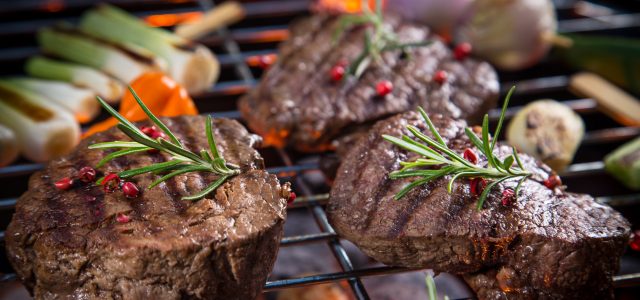
Fresh is Best
Lancashire is renowned for its local produce – especially its beef. Stephanie Sparrow tucks in
Lancashire beef is legendary. Ever since King James I allegedly knighted a tasty portion during a visit to Hoghton Tower in 1617 – and named it Sir Loin – the county has been renowned for delicious meat.
And it’s all thanks to our erratic weather, as local farmer Frank Pooley explains.
“We have a mixture of climates in Lancashire, which is what you need for the grass to grow,” he says.
Frank, who keeps British Blue cattle at Spout House Farm in Higher Wheelton, finds that a predominantly grass diet contributes to the lean meat which he says Lancashire folk prefer. “In Yorkshire and Cumbria they like it fatter,” he adds.
But it’s not just taste that draws customers to the plate pies and hot beef barms in his farm shop and tea room.
Frank says that small businesses like his are appreciated for their attention to the origins of the food they produce.
Nationwide initiatives, such as the Government’s online tracking system, monitor cattle across the UK, but buying from a local producer or butcher who knows where the beef was raised and humanely slaughtered, is the short cut to traceability and peace of mind.
“People want to buy from someone they trust,” says Susan Bracken from Newhouse Farm.
Susan supplies beef to high-end local food stores and butchers from the family farm at St Michael’s on Wyre. A member of campaigning organisation Ladies in Beef, she points out that buying local minimises food miles, and by supporting Lancashire’s farms, consumers are helping to maintain the character of the county.
“Calves and cows in the fields and hedgerows are maintained by the farmer, which in turn benefit wildlife and bees, these are quintessential images, as people tell us when they stop to photograph herds like our Aberdeen Angus for example,” says Susan.
With so many renowned local producers and butchers on our doorstep Lancashire consumers are well served. For example, Honeywells, which has a farm shop in Woodplumpton and butcheries in both Barton Grange and Bents in Glazebury, has won 13 Smithfield Meat Industry awards.
Director John Gornall, who runs the company with his brother Anthony and their wives, buys in young heifers at auction, specifically suckler beef (which has spent the first season feeding from their mothers) from Lancashire and Cumbria farms, and houses them in the Honeywell ‘finishing school for girls’.
They are bedded on barley straw, eat hay from the fields and a homemade muesli mix. The beef returns from the local abattoir to mature on the bone. “This helps intensify flavour and the meat relaxes to become tender,” says John.
He is proud of the Honeywells’ artisan butchers “who debone, cut, slice and dice”, adding “they are thrilled when customers bring a recipe into the butchery, looking for advice.”
The foodie revolution has encouraged consumers to try well-flavoured meats, and farmers have responded by rearing rare native breeds which have a beefier taste. Karen Brookes introduced marsh-fed Belted Galloway cattle into Pilling 26 years ago. Named after the white band on their backs, the Belted Galloway is known for its good nature and quality beef.
These cattle like to live at their own pace: they are slow to mature and enjoy foraging among rough pasture and gorse, a lifestyle which Karen is proud to support (she doesn’t send them to slaughter until they are three years old and uses a local abattoir to minimise journey time) and which she believes produces well-flavoured and nutritious meat.
Belted Galloways are built for outdoor living, their double-layer coat sees them though the winter and their constant foraging builds muscle.
“They build healthy fat,” Karen says of her pedigree herd, “and their pure diet means that they provide some of the best protein you will ever eat.”
Karen sells her beef cuts at the new Simply Native Rare Breed Meat shop at Cross House Farm in Great Eccleston.
You can also catch up with her in the Simply Native hot food trailer at the Southport Flower Show and other agricultural shows this summer.

